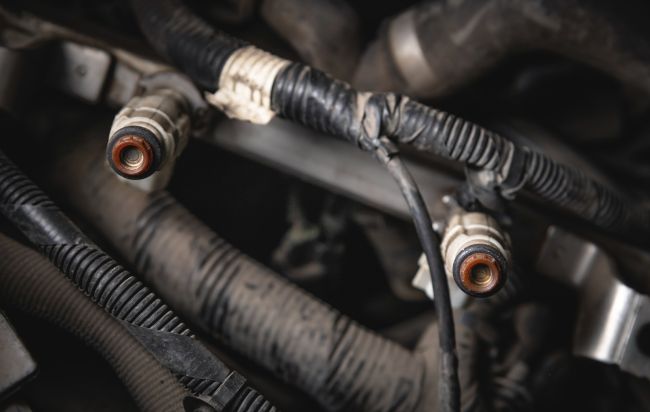
What Is the Fuel Injection System?
Fuel injectors are an intermediary part in your vehicle’s operation. Specifically, the fuel pump moves gas from the tank to the injector. The injector then sprays the fuel onto the engine in a cone-like shape with a mist consistency that burns easily. The fuel hits the intake manifold at the right spot and from here, the air and fuel mix together before they are compressed in the combustion chamber. This process then creates the chemical reaction needed to power the engine.
Yet, this process can be interrupted. Specifically, through carbon buildup accumulating on the fuel injector’s aperture that causes it to spray inconsistently or with a mist-like quality. This alters the combustion process, as well as how well your vehicle starts up and drives.
What Can Occur
The carbon ultimately forms a hard, sticky layer over the fuel injectors. Typically, this process happens over thousands of miles. When it has become more significant, you’ll notice decreased fuel economy or an engine that doesn’t deliver enough power as you accelerate. At this stage, a fuel injector cleaning will remove the deposits and flush the fuel system to completely get rid of the buildup.
If you ignore this issue, the part may experience more serious damage and need to be replaced. Due to this gradual effect, you may want to consider having the fuel injection system assessed every 60,000 to 90,000 miles.
Certain factors may cause the system to clog sooner:
- You frequently use discount or lower-priced gasoline, which contains the minimum level of detergents designed to clean the fuel injection system during use.
- Gasoline direct injection, an advanced, higher-pressure system has a higher likelihood of clogging compared to standard fuel injectors. Those with this system are recommended to regularly use a fuel system cleaner or higher-end gas.
Following a fuel injector cleaning, you may notice:
- You’re spending less on gasoline
- Your car gets better gas mileage
- Your car has a lower emissions output
While not usually part of your car’s standard maintenance schedule, this task helps improve its performance and lifespan.
Signs of a Fuel Injector Issue
The fuel injection system may need to be cleaned if:
- You’re going through gas at a faster rate
- Your car feels sluggish or experiences a delay as you accelerate or drive uphill
- Your car starts roughly or inconsistently
- You notice the car shaking as it idles
- There’s a delay after you press your foot on the gas pedal
- You hear more audible sounds as you attempt to start the car
Fuel Injector Service
Fuel injector cleaning is done in one of two ways. A solution is run through the full fuel system to dislodge and flush any deposits or the injectors are directly removed and cleaned.
Based on the degree of buildup, this process may also entail:
- Cleaning the throttle, which may be stuck in place and unable to regulate air intake.
- Cleaning any valves and seals involved in the combustion process.
- Replacing the fuel filter.
- Adding a fuel additive to help reduce moisture and carbon deposits.
Concerned about your car’s performance and fuel economy? Bring it for a diagnostic assessment and have our technicians perform any repairs or maintenance. To learn more about our services, contact us today.

